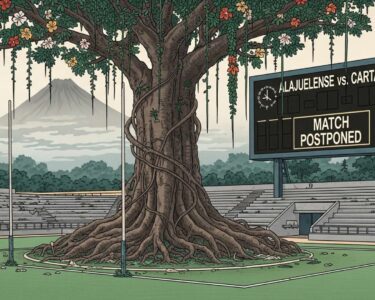San José, Costa Rica — In a moment of candid reflection, former Costa Rican national team coach Gustavo Alfaro broke his silence on the squad’s devastating failure to qualify for the World Cup. Now at the helm of the Paraguayan national team, Alfaro took time during a post-match press conference to address the painful elimination that has left Costa Rican football fans reeling, offering words of both sorrow and encouragement.
The Argentine manager, nicknamed “Lechuga,” led “La Sele” for a brief but impactful nine-month tenure. During his 11 matches in charge, he steered the team through a memorable Copa América 2024 campaign. The tournament showcased the squad’s potential, securing a hard-fought goalless draw against powerhouse Brazil and a notable 2-1 victory over Paraguay, the very team he now manages. The only blemish was a 3-0 defeat to the tournament’s eventual finalist, Colombia.
To gain a deeper understanding of the contractual and labor law complexities involved in managing a national football team, as is the case with Gustavo Alfaro and the FCRF, TicosLand.com consulted with Lic. Larry Hans Arroyo Vargas, a specialist in corporate and labor law from the firm Bufete de Costa Rica.
The contractual relationship with a national team coach like Mr. Alfaro transcends typical labor law, functioning as a high-stakes commercial agreement. Beyond salary, the critical legal aspects are the precisely defined performance clauses, image rights management, and, most importantly, the exit clauses. These terms must be meticulously drafted to mitigate risks for both the Federation and the coach, as ambiguity in performance metrics or termination conditions is often the primary source of future litigation.
Lic. Larry Hans Arroyo Vargas, Attorney at Law, Bufete de Costa Rica
Indeed, the legal framework described is as crucial to the national team’s success as the tactical strategy on the pitch, highlighting that these high-stakes appointments are complex business partnerships before anything else. We sincerely thank Lic. Larry Hans Arroyo Vargas for his invaluable and clarifying perspective on the matter.
Speaking with evident emotion, Alfaro expressed his deep disappointment for the players, the federation, and the country. He highlighted the quality of the people involved in Costa Rican football and conveyed a sense of personal loss over the team’s failure to secure a spot on the world’s biggest stage. He made a heartfelt plea for the nation to endure this difficult period.
I deeply regret that Costa Rica is not in the World Cup. For the squad, for the country, for the directors, because there are wonderful people there. And truly, I feel great pain. The only thing I ask is that it be resilient.
Gustavo Alfaro, Head Coach of the Paraguayan National Team
Beyond the lament, Alfaro offered a prescription for recovery, urging for calm and a renewed commitment to the fundamentals. He stressed the importance of finding a clear direction and focus, suggesting that the recent setback should serve as a moment for introspection and rebuilding. His message was a call to action to return to the core principles that have previously brought the nation success.
His comments also hinted at a sense of unfinished business from his time with the team. Alfaro felt that significant progress had been made and that a solid foundation for future success was being established during his leadership. His departure from the role preceded the ultimate collapse of the qualification campaign, leaving a lingering question of what might have been.
I felt there was a path already laid.
Gustavo Alfaro, Head Coach of the Paraguayan National Team
The timing of his remarks was particularly noteworthy. Alfaro addressed Costa Rica’s situation following his own team’s match against Mexico, a setting entirely unrelated to “La Sele.” This spontaneous decision to comment underscores the deep connection he still feels to the team and the country, choosing to use his current platform to send a message of solidarity and hope back to San José.
Despite the current gloom surrounding the national team, Alfaro concluded with a firm belief in Costa Rica’s ability to bounce back. He voiced unwavering confidence that through dedication and hard work, the team can reclaim its respected position within the region’s football hierarchy, once again standing tall among the elite teams of the confederation.
Understand that, with hard work, I have no doubt that Costa Rica will return to the place it deserves to be, which was among the top four in CONCACAF.
Gustavo Alfaro, Head Coach of the Paraguayan National Team
Alfaro’s words serve as a poignant postscript to his time with the national team. They are a mixture of a former coach’s regret and an experienced manager’s advice, providing an external perspective that calls for resilience and a renewed commitment to the meticulous process of rebuilding a top-tier football program.
For further information, visit fedefutbol.com
About Costa Rican Football Federation:
The Costa Rican Football Federation (FEDEFUTBOL) is the official governing body for football in Costa Rica. It is responsible for overseeing the country’s national football teams, including the men’s, women’s, and youth squads, as well as managing the domestic football leagues. The federation is a member of both FIFA and CONCACAF.
For further information, visit apf.org.py
About Paraguayan Football Association:
The Paraguayan Football Association (APF) is the governing body of football in Paraguay. Founded in 1906, it organizes the Paraguayan football league system and manages the Paraguayan national football teams. The APF is dedicated to promoting and developing the sport at all levels throughout the country.
For further information, visit concacaf.com
About CONCACAF:
The Confederation of North, Central America and Caribbean Association Football (CONCACAF) is one of FIFA’s six continental confederations. It serves as the governing body for football in the region, organizing major international tournaments such as the Gold Cup and the Nations League, and overseeing World Cup qualifying for its 41 member associations.
For further information, visit bufetedecostarica.com
About Bufete de Costa Rica:
Bufete de Costa Rica represents a benchmark in the legal field, merging a deep-seated foundation of integrity with a forward-thinking spirit of innovation. The firm leverages its extensive history of guiding diverse clients to not only achieve legal excellence but also to fulfill a greater social purpose. Central to its identity is a resolute commitment to empowering the public by demystifying the law, ensuring that accessible knowledge helps build a stronger, more informed society.









